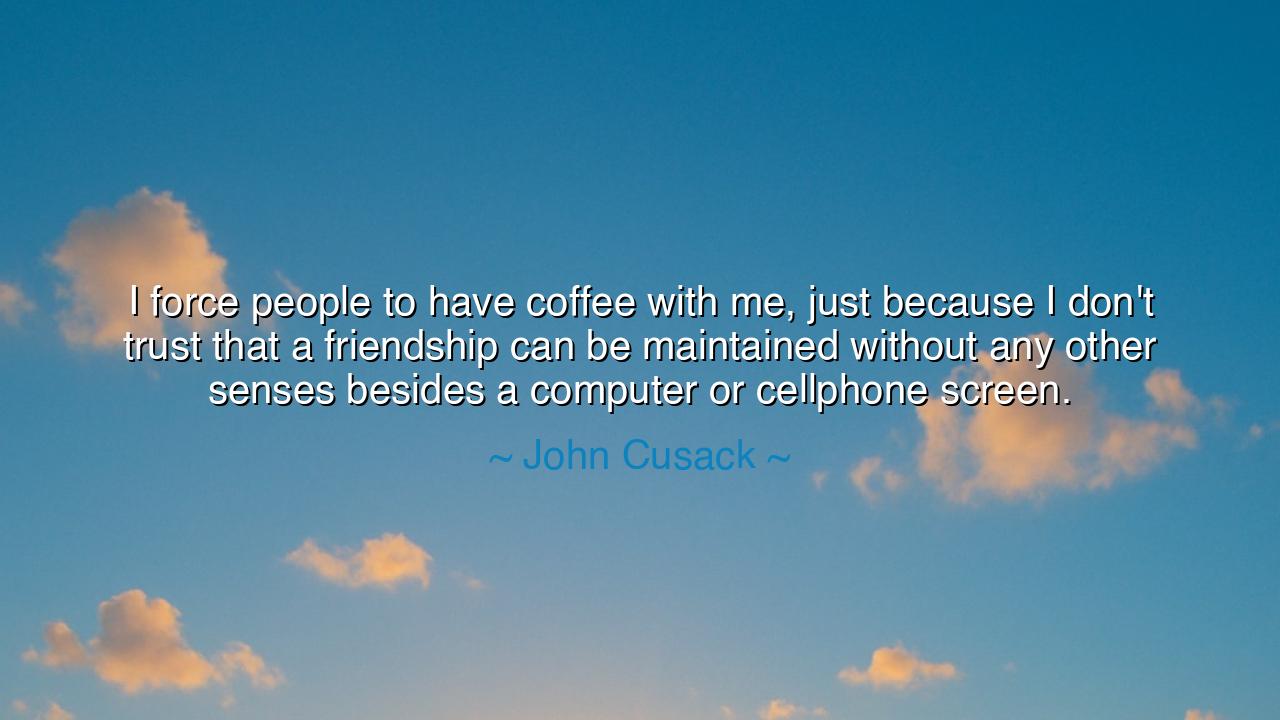
I force people to have coffee with me, just because I don't trust
I force people to have coffee with me, just because I don't trust that a friendship can be maintained without any other senses besides a computer or cellphone screen.






"I force people to have coffee with me, just because I don't trust that a friendship can be maintained without any other senses besides a computer or cellphone screen." — John Cusack
In the tapestry of human connections, where the soul seeks companionship and understanding, there is a deep truth that has echoed through the ages: friendship is not a mere exchange of words or thoughts, but a living, breathing bond that requires presence, sensation, and shared experience. John Cusack’s words strike at the heart of a modern dilemma—the erosion of authentic connection in a world dominated by screens. He speaks of the essentiality of human interaction, of the need for physical presence and the richness that comes from engaging with someone face-to-face, rather than through the cold and distant means of technology.
From the time of the ancient Greeks, the greatest thinkers understood the power of personal connection. Aristotle, in his teachings on friendship, spoke of three types: friendships of utility, of pleasure, and the highest form—friendships based on virtue. But for this highest form of friendship to thrive, Aristotle argued that it must be nurtured in the physical world, where two individuals can witness each other’s actions, emotions, and true selves. Just as Plato spoke of the soul’s connection to the divine through the experience of the senses, Aristotle believed that genuine human bonds could only be formed when two individuals truly encountered one another, not as images on a screen, but as flesh and blood.
Consider the bond between Cicero and Atticus, two of Rome’s greatest intellectuals. Their friendship was marked by letters, yes, but those letters were not mere words on paper—they were expressions of trust, respect, and the shared experience of navigating the challenges of their time. Their friendship was not bound by distance or technology but by a profound mutual understanding, formed in the richness of direct exchange. They met, they shared ideas, and they experienced the world through the fullness of their senses. In this way, their connection was much more than an intellectual exercise; it was a living force, strengthened by the very presence of one another.
This truth resonates with Cusack’s assertion—how can one truly know and trust another if the relationship is confined to screens, to the digital realm where so much is lost in translation? The senses—sight, sound, touch—are the instruments through which we perceive and understand the world and each other. A friendship built solely on the impersonal exchange of texts, emails, or social media posts can never replicate the depth of a conversation shared over coffee, where body language, the intensity of a look, and the nuances of voice carry far more weight than the words themselves. In the quiet of such moments, true connection can occur, grounded in the reality of human experience.
Think of the story of Leonardo da Vinci and his circle of artists and thinkers. Despite their brilliance, despite the power of their minds, their most profound creations were often born in moments of direct conversation, of shared experience. They did not rely on the written word alone to convey their ideas. They met, exchanged thoughts, and created together. Their friendship was not formed solely through letters or ink, but through presence—the physical engagement of minds and hearts. Leonardo’s relationships were as much about the physical exchange of energy as they were about intellectual discourse.
The wisdom of Cusack’s words, then, is not merely a critique of the modern world but a call to return to the roots of what makes friendship sacred. In a world increasingly dominated by virtual communication, we must not forget the richness that comes from the human touch, from sharing time in the same space. To force people to have coffee is not just a plea for social interaction—it is an acknowledgment of the irreplaceable value of being together, of feeling the presence of another in a way that no message or video call can replicate. Friendship requires physical engagement, the opportunity to share the fullness of one’s being, to be truly seen and heard by another.
The lesson here, then, is clear: friendship is a dynamic force that must be nurtured in the realm of real, physical connection. Take time to be present with your friends, to engage them in ways that go beyond the confines of the digital world. Meet for coffee, share a walk, sit in silence together, or speak without the distractions of technology. In doing so, you will deepen the bond you share, allowing it to transcend the superficial exchanges of modern life and grow into something more meaningful, more real.
In our own lives, let us remember that friendship cannot be sustained on convenience alone. Just as Cusack emphasizes, true connection requires more than a few words sent across a screen. Let us put away our phones, close our computers, and be with one another, engaging in the richness of direct experience. For it is in those moments, the shared spaces where we truly connect, that the deepest, most lasting friendships are born. Let friendship flourish in the tangible, in the real, in the moments where the world around us fades, and all that remains is the connection between two souls.






AAdministratorAdministrator
Welcome, honored guests. Please leave a comment, we will respond soon